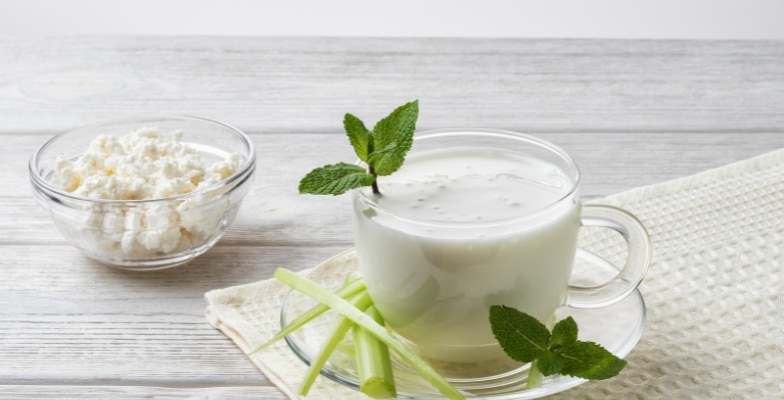What Is A Persimmon? | Persimmon Health Benefits
- Persimmon Nutrition Facts
- Persimmon Health Benefits
- How To Eat Persimmon
- Persimmon Safety Concerns
- Conclusion And My Recommendation

Fruits are gifts of nature. Not only are they vastly nutritious, but they are also delightful in taste. Another fruit on the list is persimmon. The fruit originated in China, but the Japanese variety is more popular.
Persimmon belongs to the genus Diospyros. Depending on the species and variety, persimmon’s color varies from light yellow-orange to dark red-orange. Persimmon belongs to the genus Diospyros and is usually not considered a berry, but morphologically, it is.
Persimmon Nutrition Facts
Persimmon is a fruit with a truckload of nutrients and is immensely healthy. Having a honey-like flavor, its taste is wow. The heart-shaped Hachiya is high in plant compounds called tannins, which is why it tastes bitter when eaten unripe. Tannins are a type of astringent (a chemical that shrinks body tissues).
To know your daily quota of each nutrient, you may check this link. 1https://health.gov/our-work/food-nutrition/2015-2020-dietary-guidelines/guidelines/appendix-7/
Persimmon Health Benefits
Excellent Source Of Strong Antioxidants
Persimmon stands as a rich source of antioxidants such as flavonoids and beta-carotene. Antioxidants help deactivate free radicals, highly unstable molecules that damage cells and may cause chronic diseases.
Research indicates that a diet rich in flavonoids may reduce the risk of several chronic diseases, including cancer, cardiovascular disease (CVD) and neurodegenerative disorders. 2https://pubmed.ncbi.nlm.nih.gov/25272572/
Beta-carotene belongs to the group of carotenoid antioxidants. It is responsible for the orange color of fruits, including permission. A study of around 38,000 healthy individuals concluded that diets high in beta-carotene are associated with reduced risk of type 2 diabetes. 3https://pubmed.ncbi.nlm.nih.gov/25716098/
Moreover, beta-carotene may also lower the risk of lung cancer, colorectal cancer, and heart disease, according to another investigation. 4https://www.ncbi.nlm.nih.gov/pmc/articles/PMC4886629/
High In Fiber
Heart disease is a global threat. The question is, do we have control over it? The answer is yes. A few modifications in lifestyle, including your diet, may significantly reduce your risk of developing heart disease.
There are several risk factors related to heart disease. One of them is the overconsumption of LDL cholesterol and underconsumption of dietary fiber. 5https://www.cambridge.org/core/services/aop-cambridge-core/content/view/S0007114516003445, 6https://pubmed.ncbi.nlm.nih.gov/16407729/
Foods like persimmon contain a lot of fiber. Fiber can help reduce cholesterol levels by helping your body excrete excess cholesterol. 7https://pubmed.ncbi.nlm.nih.gov/23171573/ Fiber is also known to aid gut health. It helps make bowel movements smooth. Good gut bacteria feed on fiber.
Moreover, fiber helps regulate blood sugar spikes after a meal, reducing type 2 diabetes risk. Eating foods like persimmon also gives you a feeling of fullness, helping you avoid overeating.
Related Article: What Is Fiber? Health Benefits, Food Sources And Daily Requirements
Healthy Vision
Persimmon contains a massive amount of vitamin A, which is essential for optimal eye health. Studies show vitamin A is crucial to the formation of pigments responsible for absorbing light. 8https://scholarcommons.sc.edu/cgi/viewcontent.cgi?article=1098&context=jscas
It also helps maintain the proper structure of the retina. The beta-carotene in persimmon gets converted into vitamin A in the human body. So, you can imagine how healthy persimmon may be for your eyes.
We already know persimmon has a store of powerful antioxidants. Such antioxidants are lutein and zeaxanthin. Lutein and zeaxanthin may lessen the risk of eye diseases, including age-related macular degeneration, which causes vision loss. 9https://www.ncbi.nlm.nih.gov/pmc/articles/PMC4838793/, 10https://pubmed.ncbi.nlm.nih.gov/26447482/
Brain Health
Fisetin is a plant compound found in persimmon that is associated with many health benefits. Studies suggest fisetin may reduce the impact of age-related neurological diseases, especially those associated with cognitive deficits such as Alzheimer’s disease. 11https://www.ncbi.nlm.nih.gov/pmc/articles/PMC5527824/
How To Eat Persimmon
Here are a few ways you can enjoy persimmon in your daily diet.
-Thoroughly wash and eat it fresh
-Dice into yogurt, oatmeal or salads
-Use in smoothies
-Add to a mocktail
-Dry or bake, then drizzle honey on them
-Make them an ingredient in granola or muesli
Persimmon Safety Concerns
Allergy
Allergy from persimmon is rare but possible. Typical symptoms include hives, vomiting, dizziness, and difficulty breathing.
Stomach Issues Or Surgery
If you have stomach issues or have had stomach surgery, it is better to avoid persimmon, especially the unripe astringent ones.
Effect Of Unripe Astringent Persimmons
Unripe astringent persimmons contain a high level of tannins, which might make your mouth dry and numb for a while.
Intestinal Stones And Digestion
Unripe astringent persimmons can also make food particles stick together, leading to intestinal stones and even slow digestion.
The message here is to eat astringent persimmons when they are entirely ripe. You can eat non-astringent varieties when they are not fully ripe. Here is a list of some astringent and non-astringent types of persimmon:
Astringent Types
-Hachiya
-Saijo
-Chocolate
-Great Wall
-Tanenashi
-Giombo
-Ormond
-Maru
-Tipo
Non-Astringent Types
-Fuyu
-Giant fuyu
-Jiro
-Ichi-ki-kei-jiro
-Dan gam
-Hana fuyu
-Maekawa jiro
Remember, the ideas in this article are not a substitution for medical advice. If you have health concerns, you should talk to your doctor before adding any food to your diet.
Conclusion And My Recommendation
Are persimmons good for you? Good? They are great! An overlooked fruit, persimmon is highly nutritious. It provides excellent health benefits. Antioxidants in the fruit help reduce the risk of certain chronic diseases. An immense amount of vitamin A in persimmon gives the eyes a healthy boost.
Persimmon may help tackle heart issues, as its fiber helps reduce LDL cholesterol. Fiber also supports gut health and gives a sense of satiety. Some studies show the promising effect of fruit on brain health. Therefore, if eaten in moderation, persimmon can be an excellent part of a healthy diet.
What do you think of this article? Have any questions? Let me know in the comments below!

Skill-Based Education.
Global Recognition.
Powerful Community Building
Secure a certificate of completion in as little as a day by graduating from one of our free courses.
Get Access to Our Free Courses. No Credit Card Required.

Fabulous Body Membership
Your All-Access Pass to A Fabulous Body & A Rewarding Career
25+ Certificate Courses & Programs, All Included
15 Day Free Trial, 100% Money-Back Guarantee
About Rohit Kumar
Rohit Kumar is an avid writer who puts a lot of his emotions in words through his articles. Today, he is a certified fitness expert with a vast knowledge on nutrition and has contributed to the pages of Fabulous Body with his articles.










